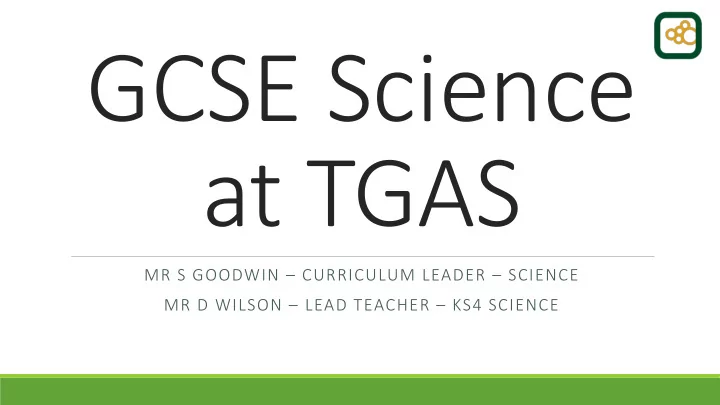

GCSE Science at TGAS MR S GOODWIN – CURRICULUM LEADER – SCIENCE MR D WILSON – LEAD TEACHER – KS4 SCIENCE
Overview AQA board 100% assessment through terminal examinations (June 2018) 2 pathways ◦ GCSE Combined Science: Trilogy ◦ GCSE Biology, Chemistry and Physics
The story so far All students are studying our in- house “fundamental science” course. 3 units (Biology, Chemistry and Physics) covering the essential content to prepare students for GCSE studies. Final assessment for this course – w/c 14 th of December. Current settings (mixed ability) will remain for spring and summer term 2015
Course content Both pathways students can move through will cover; Forces Cell biology Atomic structure and the periodic table Energy Organisation Bonding, structure, and the properties of Infection and response matter Waves Electricity Bioenergetics Quantitative chemistry Homeostasis and response Chemical changes Magnetism and electromagnetism Inheritance, variation and evolution Energy changes Particle model of matter Ecology The rate and extent of chemical change Organic chemistry Atomic structure Chemical analysis Chemistry of the atmosphere Using resources
GCSE Science: Trilogy Covers all three science disciplines over Y9, Y10 and Y11 Allows further study at A-level 6 examination papers (two for each science) Students will obtain 2 GCSEs on a 17 points grading scale (9-9, 9,8 • 1 hour 15 minutes each through to 2,1,1-1) • F and H tier available • 16.7% per paper (70 marks) • Multiple choice, structure, 16 required practical's to complete – 15% of examination questions relate to these closed, short and open response questions 10% of biology questions, 20% of chemistry and 30% of physics questions require higher tier GCSE mathematics skills
GCSE Biology, Chemistry and Physics Covers all GCSE Science: Trilogy content along with much more challenging content in each science area. Allows for further study at A-level 2 examination papers per science (6 in total) • 1 hour 45 minutes Students will obtain 3 GCSEs, each with a separate grade (9- 1) for each science • 50% per paper (100 marks) • Multiple choice, structure, closed, short and open 8 required practical's per science -15% of examination questions relate to these response questions 10% of biology questions, 20% of chemistry and 30% of physics questions require higher tier GCSE mathematics skills
Moving onto GCSE studies Y10 Spring and Y11 Autumn term Summer term Y10 Autumn Complete paper 2 GCSE Science: content – GCSE Science: term Trilogy Trilogy route Y11 Spring and summer Y9 Spring and All students Begin paper 2 term Summer term content – GCSE complete Complete revision of all Science: Trilogy content All students paper 1 begin paper 1 content – Y10 Spring and Y11 Autumn term content – GCSE Science: summer term Complete Biology, Chemistry GCSE Science: and Physics exclusive Trilogy content + practicals GCSE Sep sci route Trilogy Paper 1 trial Y11 Spring and summer term Complete paper 2 examination content – GCSE Complete revision of all Science: Trilogy content
How can you support your child? Purchase revision guides – likely to be available in the summer term 2016 Purchase and complete past paper questions – available prior to trial examinations in autumn 2016 Encourage your child to complete booster booklet tasks – available from January Encourage your child to complete optional homework tasks – available in TGiSpace
Recommend
More recommend